

Girolamo Cardano was an Italian doctor, natural philosopher, and mathematician who became a best-selling author in Renaissance Europe. He was also a leading astrologer of his day, whose predictions won him access to some of the most powerful people in sixteenth-century Europe. In Cardano’s Cosmos, Anthony Grafton invites readers to follow this astrologer’s extraordinary career and explore the art and discipline of astrology in the hands of a brilliant practitioner.
Renaissance astrologers predicted everything from the course of the future of humankind to the risks of a single investment, or even the weather. They analyzed the bodies and characters of countless clients, from rulers to criminals, and enjoyed widespread respect and patronage. This book traces Cardano’s contentious career from his first astrological pamphlet through his rise to high-level consulting and his remarkable autobiographical works. Delving into astrological principles and practices, Grafton shows how Cardano and his contemporaries adapted the ancient art for publication and marketing in a new era of print media and changing science. He maps the context of market and human forces that shaped Cardano’s practices—and the maneuvering that kept him at the top of a world rife with patronage, politics, and vengeful rivals.
Cardano’s astrology, argues Grafton, was a profoundly empirical and highly influential art, one that was integral to the attempts of sixteenth-century scholars to understand their universe and themselves.
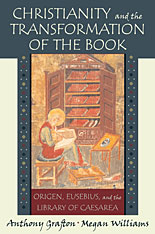
When early Christians began to study the Bible, and to write their own history and that of the Jews whom they claimed to supersede, they used scholarly methods invented by the librarians and literary critics of Hellenistic Alexandria. But Origen and Eusebius, two scholars of late Roman Caesarea, did far more. Both produced new kinds of books, in which parallel columns made possible critical comparisons previously unenvisioned, whether between biblical texts or between national histories. Eusebius went even farther, creating new research tools, new forms of history and polemic, and a new kind of library to support both research and book production.
Christianity and the Transformation of the Book combines broad-gauged synthesis and close textual analysis to reconstruct the kinds of books and the ways of organizing scholarly inquiry and collaboration among the Christians of Caesarea, on the coast of Roman Palestine. The book explores the dialectical relationship between intellectual history and the history of the book, even as it expands our understanding of early Christian scholarship. Christianity and the Transformation of the Book attends to the social, religious, intellectual, and institutional contexts within which Origen and Eusebius worked, as well as the details of their scholarly practices--practices that, the authors argue, continued to define major sectors of Christian learning for almost two millennia and are, in many ways, still with us today.,
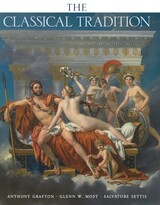
“A vast cabinet of curiosities.”—Stephen Greenblatt
“Eclectic rather than exhaustive, less an encyclopedia than a buffet.”—Frederic Raphael, Literary Review
How do we get from the polis to the police? Or from Odysseus’s sirens to an ambulance’s? The legacy of ancient Greece and Rome has been imitated, resisted, misunderstood, and reworked by every culture that followed. In this volume, some five hundred articles by a wide range of scholars investigate the afterlife of this rich heritage in the fields of literature, philosophy, art, architecture, history, politics, religion, and science.
Arranged alphabetically from Academy to Zoology, the essays—designed and written to serve scholars, students, and the general reader alike—show how the Classical tradition has shaped human endeavors from art to government, mathematics to medicine, drama to urban planning, legal theory to popular culture.
At once authoritative and accessible, learned and entertaining, comprehensive and surprising, and accompanied by an extensive selection of illustrations, this guide illuminates the vitality of the Classical tradition that still surrounds us today.
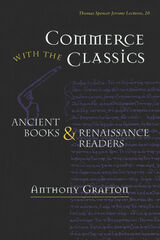
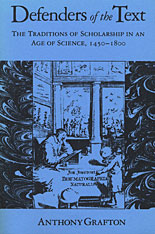
Anthony Grafton is erudite and elegant in the style of the best historical writers who make the past come alive for the reader. In a full-scale presentation of the world of scholarship, from the Renaissance to the modern period, Grafton sets before us in three-dimensional detail such seminal figures as Poliziano, Scaliger, Kepler, and Wolf. He calls attention to continuities, moments of crisis, and changes in direction.
The central issue in Defenders of the Text is the relation between humanism and science from the mid-fifteenth century to the beginning of the modern period. Treatments of Renaissance humanism in English have emphasized the humanists’ commitment to rhetoric, ethics, and politics and have accused the humanists of concentrating on literary matters in preference to investigating the real world via new developments in science, philosophy, and other technical disciplines. This revisionist book demonstrates that humanism was neither a simple nor an impractical enterprise, but worked hand-in-hand with science in developing modern learning.
Grafton makes clear that humanism remained an integral and vital part of European culture until the eighteenth century, maintaining a technical component of its own—classical philology—which developed in as rich, varied, and unexpected a way as any other field of European thought. Attention to the text led the humanists to develop a whole range of cools and methods that lent power to science and learning for centuries to come. Grafton shows the continued capacity of classical texts to provoke innovative work in both philology and philosophy, and traces a number of close and important connections between humanism and natural science. His book will be important to intellectual historians, students of the classics and the classical tradition, and historians of early modern science.
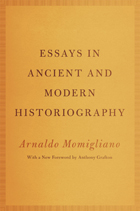
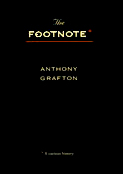

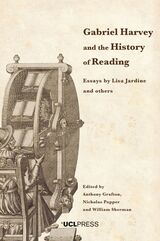
Few articles in the humanities have had the impact of Lisa Jardine and Anthony Grafton’s seminal “Studied for Action,” a study of the reading practices of Elizabethan polymath and prolific annotator Gabriel Harvey. Their excavation of the setting, methods, and ambitions of Harvey’s encounters with his books ignited a new interdisciplinary field, the history of reading, which quickly became one of the most exciting corners of the scholarly cosmos. A generation inspired by the model of Harvey fanned out across the world’s libraries and archives, seeking to reveal the many creative, unexpected, and curious ways that individuals throughout history responded to texts, and how these interpretations, in turn, illuminate past worlds.
Three decades on, Harvey’s example and Jardine’s work remain central to cutting-edge scholarship in the history of reading. By uniting “Studied for Action” with new studies on Gabriel Harvey, some of which are published here for the first time, by Jardine, Grafton, and the scholars they have influenced, this collection provides a unique lens on the place of marginalia in textual, intellectual, and cultural history. The chapters capture subsequent work on Harvey and map the fields opened by Jardine and Grafton’s original article, collectively offering a posthumous tribute to Lisa Jardine and an authoritative overview of the History of Reading.
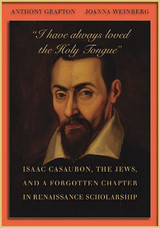
“[An] extraordinary book.” —New Republic
Fusing high scholarship with high drama, Anthony Grafton and Joanna Weinberg uncover a secret and extraordinary aspect of a legendary Renaissance scholar’s already celebrated achievement. The French Protestant Isaac Casaubon (1559–1614) is known to us through his pedantic namesake in George Eliot’s Middlemarch. But in this book, the real Casaubon emerges as a genuine literary hero, an intrepid explorer in the world of books. With a flair for storytelling reminiscent of Umberto Eco, Grafton and Weinberg follow Casaubon as he unearths the lost continent of Hebrew learning—and adds this ancient lore to the well-known Renaissance revival of Latin and Greek.
The mystery begins with Mark Pattison’s nineteenth-century biography of Casaubon. Here we encounter the Protestant Casaubon embroiled in intellectual quarrels with the Italian and Catholic orator Cesare Baronio. Setting out to understand the nature of this imbroglio, Grafton and Weinberg discover Casaubon’s knowledge of Hebrew. Close reading and sedulous inquiry were Casaubon’s tools in recapturing the lost learning of the ancients—and these are the tools that serve Grafton and Weinberg as they pore through pre-1600 books in Hebrew, and through Casaubon’s own manuscript notebooks. Their search takes them from Oxford to Cambridge, from Dublin to Cambridge, Massachusetts, as they reveal how the scholar discovered the learning of the Hebrews—and at what cost.
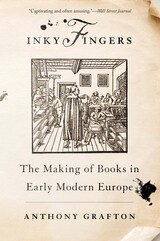
An Open Letters Review Best Book of the Year
“Grafton presents largely unfamiliar material…in a clear, even breezy style…Erudite.”
—Michael Dirda, Washington Post
In this celebration of bookmaking in all its messy and intricate detail, Anthony Grafton captures both the physical and mental labors that went into the golden age of the book—compiling notebooks, copying and correcting proofs, preparing copy—and shows us how scribes and scholars shaped influential treatises and forgeries.
Inky Fingers ranges widely, from the theological polemics of the early days of printing to the pathbreaking works of Jean Mabillon and Baruch Spinoza. Grafton draws new connections between humanistic traditions and intellectual innovations, textual learning and the delicate, arduous, error-riddled craft of making books. Through it all, he reminds us that the life of the mind depends on the work of the hands, and the nitty gritty labor of printmakers has had a profound impact on the history of ideas.
“Describes magnificent achievements, storms of controversy, and sometimes the pure devilment of scholars and printers…Captivating and often amusing.”
—Wall Street Journal
“Ideas, in this vivid telling, emerge not just from minds but from hands, not to mention the biceps that crank a press or heft a ream of paper.”
—New York Review of Books
“Grafton upends idealized understandings of early modern scholarship and blurs distinctions between the physical and mental labor that made the remarkable works of this period possible.”
—Christine Jacobson, Book Post
“Scholarship is a kind of heroism in Grafton’s account, his nine protagonists’ aching backs and tired eyes evidence of their valiant dedication to the pursuit of knowledge.”
—London Review of Books
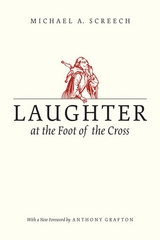
But we are fortunate in our guide: drawing on his immense knowledge of the classics and of humanists like Erasmus and Rabelais—who used Plato and Aristotle to interpret the Gospels—and incorporating the thoughts of Aesop, Calvin, Lucian of Samosata, Luther, Socrates, and others, Screech shows that Renaissance thinkers revived ancient ideas about what inspires laughter and whether it could ever truly be innocent. As Screech argues, in the minds of Renaissance scholars, laughter was to be taken very seriously. Indeed, in an era obsessed with heresy and reform, this most human of abilities was no laughing matter.
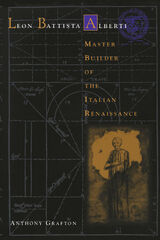
Leon Battista Alberti (1404-1472) was one of the most exciting figures of the Italian Renaissance. He wrote the first modern treatise on painting, the first modern manual of classical architecture, and a powerful set of "dialogues" about the princely families of Florence. But Alberti also made his own spectacular advances in the art of painting and in engineering, and was responsible for some of the most exciting architectural designs in Italy.
In this volume, one of our most distinguished Renaissance scholars offers the superlative biography and cultural history that Alberti has long deserved. It is a compelling portrait of a mysterious and original intellectual.
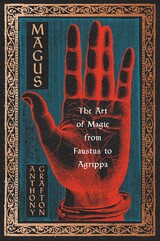
A revelatory new account of the magus—the learned magician—and his place in the intellectual, social, and cultural world of Renaissance Europe.
In literary legend, Faustus is the quintessential occult personality of early modern Europe. The historical Faustus, however, was something quite different: a magus—a learned magician fully embedded in the scholarly currents and public life of the Renaissance. And he was hardly the only one. Anthony Grafton argues that the magus in sixteenth-century Europe was a distinctive intellectual type, both different from and indebted to medieval counterparts as well as contemporaries like the engineer, the artist, the Christian humanist, and the religious reformer. Alongside these better-known figures, the magus had a transformative impact on his social world.
Magus details the arts and experiences of learned magicians including Marsilio Ficino, Pico della Mirandola, Johannes Trithemius, and Heinrich Cornelius Agrippa. Grafton explores their methods, the knowledge they produced, the services they provided, and the overlapping political and social milieus to which they aspired—often, the circles of kings and princes. During the late fifteenth and early sixteenth centuries, these erudite men anchored debates about licit and illicit magic, the divine and the diabolical, and the nature of “good” and “bad” magicians. Over time, they turned magic into a complex art, which drew on contemporary engineering as well as classical astrology, probed the limits of what was acceptable in a changing society, and promised new ways to explore the self and exploit the cosmos.
Resituating the magus in the social, cultural, and intellectual order of Renaissance Europe, Grafton sheds new light on both the recesses of the learned magician’s mind and the many worlds he inhabited.
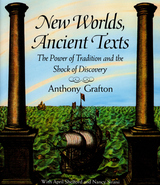

READERS
Browse our collection.
PUBLISHERS
See BiblioVault's publisher services.
STUDENT SERVICES
Files for college accessibility offices.
UChicago Accessibility Resources
home | accessibility | search | about | contact us
BiblioVault ® 2001 - 2024
The University of Chicago Press









